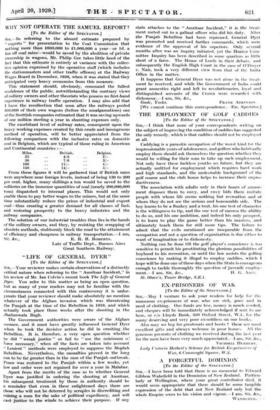"LIFE OF GENERAL DYER" [To the Editor of the SPECTATOR.]
SIR,—Your reviewer makes certain observations of a distinctly critical nature when referring to the " Amritsar Incident," in his review of Mr. Ian Colvin's recent book The Life of General Dyer. You refer to this matter as being an open question, but as many of your readers may not be familiar with the circumstances connected with this controversy it is unfor- tunate that your reviewer should make absolutely no mention whatever of the Afghan invasion which was threatening the Punjab at the time of the Rebellion in 1919, and which actually took place three weeks after the shooting in the Jhalianwala Bagh.
The Government authorities were aware of the Afghan menace, and it must have greatly influenced General Dyer when he took the decisive action he did in crushing, the Rebellion. It is, therefore, a very open question whether he did " wreak justice " or fail to " use the minimum o force necessary," when all the facts are taken into account " Lenient " methods were employed to suppress the Moplah Rebellion. Nevertheless, the casualties proved in the long run to be far greater than in the case of the Punjab outbreak. Peace was restored to the Punjab within a few weeks, yet law and order were not regained for over a year in Malabar.
Apart from the merits of the case as to whether General Dyer was justified in ordering the shooting at Amritsar, his subsequent treatment by those in authority should be a reminder that even in these enlightened days there are those who will not be deterred by scruples in discrediting and ruining a man for the sake of political expediency, and will cast justice to the winds to achieve their purpose. If any
stain attaches to the ." Amritsar Incident," it ia.the treat- ment meted out to a -gallant officer who did his duty. After the Punjab Rebellion had been repressed, General Dyer was promoted and received further commands, which were evidence of the approval of his superiors. Only . several months after was an inquiry initiated, yet the Hunter t'Om- mittee -Inquiry.. has been described in some quarters as little short of a farce. The House of Lords in their debate, and subsequently the English High Court in the case of O'Dwyer v. Nair, took a very different view from that of the India Office in the matter.
It happens that General Dyer was not alone in the treat- inent he received, and while the Government of India could grant amnesties right and left to revolutionaries, loyal and distinguished servants of the Crown were rewarded with dishonour.—I am, Sir, &c.,
Gook, Yorks. FRANK ATKINSON. [We cannot continue this correspondence.—En. Spectator.]
























































 Previous page
Previous page